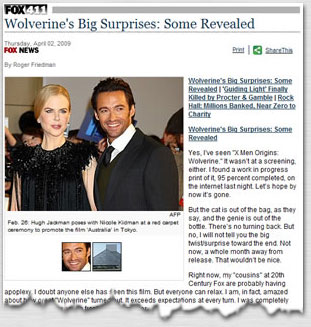Seven years ago, I wrote a three-part blog post (parts one, two and three) on what I saw as being the future of television. And despite the fact that TV content producers seem intent on taking a very different course, I stand by my assertion that the system I described back then would be the best available, given the bandwidth.
My idea was based upon the difference between broadcasting and narrowcasting, and how ad revenue is generated. Currently, television initially generates revenue by being broadcast over the airwaves, carrying advertising (more and more each year, it seems) during the commercial breaks. The problem: it is difficult to create an ad that will appeal to more than just a small portion of the audience. You are sending the exact same ad to millions of people who are so varied that most will not respond to the ad, and some may even have a negative reaction to it. As a result, the effectiveness of ads is only a tiny percent of what is possible, wasting the vast majority of ad revenue potential.
In recent years, another two revenue streams have appeared for these shows: sales of DVD sets, and, similar in certain ways but different in others, online sales of the episodes. While ads may still play into them, these versions mostly make their money by the customer paying up-front. A season of a TV show on DVD might range from less than $20 to up to $100. TV shows for download often cost $2 an episode.
There are significant problems with these models. As mentioned above, TV broadcasting is massively inefficient. Add to that the fact that shows are dribbled out by day or week, disappear and are inaccessible for months or years at a time, and appear only on a pre-determined schedule which is easy to miss. Not very user-friendly.
Sales of DVDs had an initial burst, but now the medium is struggling a bit more. People are catching on to the fact that paying $150 for a full series of TV shows seemed like a good idea at first, but later realize that they might never watch it again. Furthermore, since these must be bought physically, they are not available on demand, immediately on a whim. (Services like Netflix successfully play to these weaknesses.)
And not many people are going to cough up $2 to watch something they can get on TV for free, or can be bought cheaper by season on Blu-ray with HDTV quality and extra features like deleted scenes, outtakes, commentary and featurettes. Frankly, I never understood that model at all. In fact, the whole idea of paying for TV is still relatively alien to many people: TV has been free for most of our lives, and many almost see it as an expected right. I’d be willing to wager that if you polled people and asked if it was wrong to pirate software, movies, books, and TV shows, most would say it was wrong to pirate the first three, but few would have as much problem with pirating TV shows. They’re on TV, after all!
All of this is tainted more by the senseless paranoia of the content producers and their fear of piracy and loss of control, which pushes them to add DRM and other restrictive features that only hurt paying customers, and result in more people resorting to piracy.
In 2003, I suggested a different take: targeted advertising and narrowcasting. Put all TV and a great deal of movie content on the web, for unlimited free streaming and viewing at any time the viewer desires. The cost: the viewer must make their commercial preferences known, filling in a bit of information once a month. When the viewer then asks for a presentation of media, the content, originally with blank spaces for advertising, is filled with ads that are targeted at that one viewer.
The benefits for all sides is great. First, the viewers: they not only get everything they want, a virtually unlimited, all-you-can-eat buffet of on-demand content, but it’s free of charge. And while there are as many commercials as before, there is a huge benefit: the commercials are all ones that you want to see.
That’s the secret: by filling out some personal info, specifically (a) what are your interests, (b) what do you plan to purchase in the near future, and (c) what kind of commercials do you like, in addition to a few other bits of indicative data, TV ads could be transformed into something the viewer will want to watch. Currently, commercials are things to avoid–mute the sound and take a kitchen or bathroom break. But the truth is, there are commercial we all want to see. But because commercials today are broadcast, perhaps 97% of them don’t interest us, so we tend to skip them all.
But what if the commercials were directed at your interests? For example, if the ads were all for movies, new books, computer stuff, and some other things I am interested in, I would probably be interested in staying with the commercials, watching them all and letting them have their hypnotic, subliminal way with my subconscious.
There could even be feedback, a “next” switch for commercials–if an ad comes up that you don’t like, just zap it with the remote. This could be used to build up data on what you do and do not like, and so be utilized to weed out the remaining commercials that you don’t want to see–kind of like Apple’s “Genius” feature in iTunes. This could also be used to sharpen their targeting; random ads could be tossed into your mix, and by analyzing what you zap, they can build up a scenario of what new stuff they can throw at you which you might like.
The benefit for advertisers should be abundantly clear: the efficiency of ads rockets from single-digits to near-perfection. Instead of people turning off ads, people will stay and watch them, and might even look forward to them. Even good commercials suffer from the taint of being commercials, with all the negativity currently associated with that medium. But if people begin to like commercials, their effectiveness will increase beyond just the growth in targeted exposure.
This will, in the end, benefit the content producers the most: because each ad sold will be up to 20 times more effective, they can up the revenue that much more. And since viewers will not mind the commercials so much, they won’t get as much blowback for adding more ads, up to a certain point of course.
But the best part is that by making the content freely available over the Internet, you completely defeat the problem of piracy. Downloading pirated stuff is not too difficult, but most people would much prefer a free alternative, and would certainly find it easier to use. If the model I describe were used, then there would be no need to resort to piracy, unless you are religiously opposed to advertising of any kind, or are the kind of person who refuses to divulge any info about yourself.
And that would be the point probably most focused-on with this system: giving up personal data. For a long time, many people have been concerned about what data is collected about them, and how it is used and potentially abused. Privacy looms large, and admittedly, the model I describe above seems to ask the viewer to surrender a great deal of that privacy.
Well, yes and no. First of all, we surrender privacy every day. When you join new web services, buy something online, or download free software, chances are you are giving away a good deal of private information, including your name, age, email addresses, physical addresses, profession, and a lot of other stuff. We commonly post personal information online, from our profile on social networking sites, to our hobbies and preferences in telling people what we like, to our political and religious feelings on blogs and forums.
Advertisers already suck in volumes of data about us. Take that supermarket member card that’s in your wallet, which you have no problem swiping at Safeway to get the “discounts” connected to it. That card is connected to your name, address, and other info they get from you and about you via other means (including public land ownership records, career info, etc.). Every time you buy stuff with it, they record what you bought, how much you bought, when you bought it and at what price, and use that data for advertising and for presentation & pricing of goods they sell you. Similar goes for your credit card trail, and other things you use without thinking about them.
The fact is, you already hand out, usually for no actual benefit to you, far more information than I propose is involved in the system I laid out. In fact, if privacy is truly a concern, then the system could be set up so that the data collected for this TV system would be completely unconnected to your name and public identity. The reason they collect your name, address, and other data is so they can use it to predict what you’ll want to buy. In the system I propose, they don’t need to do that. Frankly, I don’t think they really care what your name and address are; they only want to make money off of you. And if you are telling them exactly what you are interested in buying, what you’re looking for, then they don’t need that info, and could easily do without it.
So when you join this system, you could do so anonymously; your name and address are never asked for and never given. Nothing needs ever be tracked back to you personally. By giving more personal information, the system becomes more private.
I truly see this as being the optimal system for everyone. There’s a problem, though: fear, stupidity and greed. (Aren’t they
always the problem?)
What set me off on this topic? This story about Apple’s rumored plan to rent TV shows for 99 cents. Frankly, I see this as still too expensive. Sure, better than regular TV because the ads aren’t there and it’s on my schedule, but worse than buying the DVD later on because the resolution is poorer, there are no extra features, and you don’t get to keep them.
But the content producers are calling this new model dangerous. Why? Because they saw the music industry lose their evil, usurious model, and fear that somehow something similarly bad will happen to them. So they shy away from even a model which would still be far from perfect and skitter back to even less perfect models.
Argh. It frustrates me to see them wear their fear and greed so transparently, to be so idiotic in their pursuit of fleecing the public, when it seems that a far superior system is available–but they are just backing away from it, step by fear-filled, idiotic, greedy step.


 He was no doubt slightly underestimating that level of apoplexy, and somewhat oblivious himself as to how they would react to someone within the corporate family bragging aloud about how they had downloaded the movie and reporting on a news web site how cool it was.
He was no doubt slightly underestimating that level of apoplexy, and somewhat oblivious himself as to how they would react to someone within the corporate family bragging aloud about how they had downloaded the movie and reporting on a news web site how cool it was.

 Sachi and I are probably going to spring for a 42“ HDTV in the next week or two. Any recommendations? I like the Toshiba Regza ZH7000 for the HDD recording feature, but am less than thrilled that the lack of a VGA port means I won’t be able to connect my new Macbook Pro, at least not yet. Sharp’s Aquos seems to be the only one to sport an English option for the menus, significant because I’m the one who usually uses the menus and the language is hard to decipher. Some have Internet browsing (but never with a keyboard), others have special split-screen capabilities, and so forth. We’re looking for something in the ¥200,000 ~ ¥230,000 range preferably.
Sachi and I are probably going to spring for a 42“ HDTV in the next week or two. Any recommendations? I like the Toshiba Regza ZH7000 for the HDD recording feature, but am less than thrilled that the lack of a VGA port means I won’t be able to connect my new Macbook Pro, at least not yet. Sharp’s Aquos seems to be the only one to sport an English option for the menus, significant because I’m the one who usually uses the menus and the language is hard to decipher. Some have Internet browsing (but never with a keyboard), others have special split-screen capabilities, and so forth. We’re looking for something in the ¥200,000 ~ ¥230,000 range preferably.